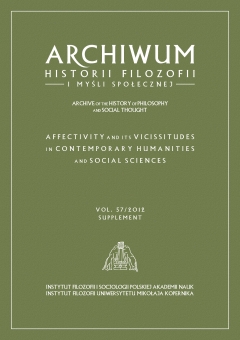L’image et l’affectivité: le problème du sujet dans la notion bachelardienne d’imagination
Image and Affectivity: Question of Subject in Bachelardian Notion of Imagination
Author(s): Anton VydraSubject(s): Contemporary Philosophy, Philosophy of Mind, Philosophy of Science, Psychoanalysis, Theory of Literature
Published by: Instytut Filozofii i Socjologii Polskiej Akademii Nauk
Keywords: Bachelard; material imagination; limit of subjectivity; reverie; poetics; intersubjectivity;
Summary/Abstract: The paper concerns with Bachelard’s notion of image, which according to him is not an external object, but it arises in the frontiers of the subjectivity. This subjectivity is not rational in Cartesian way, but it is characterized by weak cogito, less-cogito. Therefore, the subjectivity of reader or day-dreamer (rêveur) means the limit-consciousness, the limit-cogito. The first part of the paper is a methodological entrance to the question of poetical and rationalistic thinking of Gaston Bachelard. The author examines characteristics and sense of poetical reflections in the works of rationalistic philosopher. In the second part the text touches three ways to the lecture of Bachelard’s Poetics and of books about elements. It points out the “Copernican Turn” in the thinking of French philosopher, which is dated to the year 1942 (by book Water and Dream). Since that Bachelard is not writing on poetry because of “enumeration of errors” of consciousness. The origin of the image (départ de l’image) in the individual consciousness is the topic of the third part of the paper. Bachelard writes about it in The Poetics of Space, and the interpretation of this text shows where the place of this origin is. Similarly as the flesh (la chair) in later Merleau-Ponty it is neither subject nor object, but the e l e m e n t , bachelardian image is likewise in-between the subjective and the objective. The fourth part solves the meaning of the notions of archetypes and trans-subjectivity in Bachelard, and pays attention to inter-subjective themes related to the question of the image. Bachelardian material image is not only a possession of the individual, but other human beings participate on it, too, because material images are archetypal and other can affirm their value as the well-known images.
Journal: Archiwum Historii Filozofii i Myśli Społecznej
- Issue Year: 2012
- Issue No: 57supl.
- Page Range: 179-194
- Page Count: 16
- Language: French

